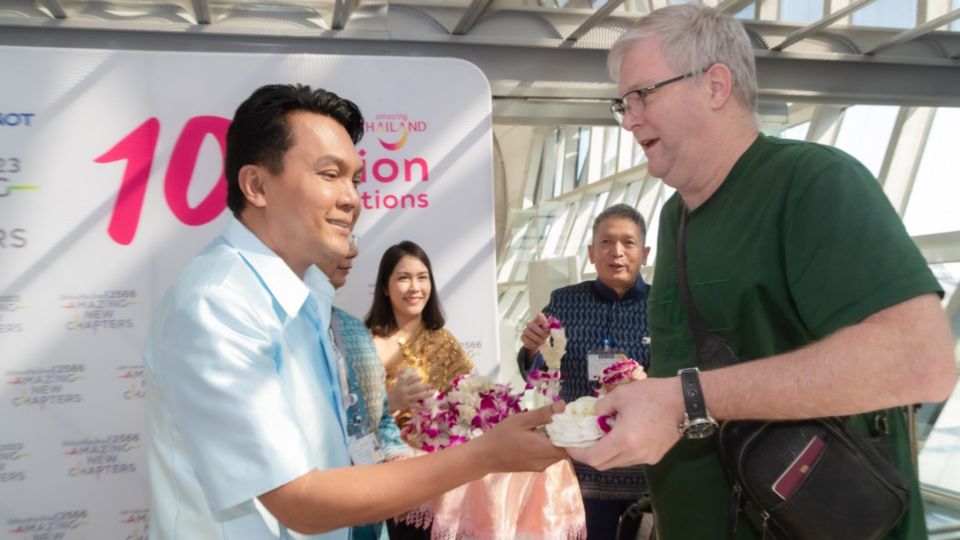After years of false starts, Thailand is about to start slapping fees on every arriving tourist, a measure being adopted in the post-pandemic era in countries ranging from Brussels and Oslo to the Maldives.
While various fees have been considered and rejected over the years, officials began beating the drum last year for a THB300 fee that would offset tourist healthcare costs and be reinvested in tourism development. That’s now set to take effect in June.
There are still five months for them to reconsider: Arrival fees for travelers have been proposed numerous times in years past, only to be abandoned or shelved under criticism, such as a THB360 “tourism maintenance fee” proposed by the tourism authority in 2016. Indeed, the fee was supposed to happen nine months ago.
It will technically be the third fee assessed on travelers, after the THB700 departure fee and hotel tax, which is currently under moratorium.
While that has led to some grousing, the question of whether it could be imposed on resident foreigners has reignited complaints about how broadly the term “tourist” is used after Tourism Minister Phiphat Ratchakitprakarn told reporters earlier this week that work permit holders would be exempt.
Not every immigrant – hello, retirees and spouses! – has one.
“Let’s put aside the ‘it’s only ten bucks’ argument because I couldn’t care less if it was ten times that,” longtime resident Phil Williams wrote on Twitter. “What I object to is it being called a ‘tourist fee’ when let’s be brutally honest, it’s actually a foreign face without a work permit fee.’”
Williams objected to the frequent conflation of immigrants and tourists and retirees, as various government policies introduced over the years have failed to make the distinction, such as when dual-pricing was introduced at Thailand’s public hospitals.
“Further proof that without a work permit, you’re just ‘another foreign tourist’ regardless of how long you’ve lived here, who you’re married to and whatever retirement dream bollocks you’ve been spun,” he said. “There’s something just not right about it.”
Benjamin Clarke was hopeful that a broader exemption would come before June.
“I don’t really get it – those on Non O & retirement visas need proof of income here anyway, which is what distinguishes [Work Permit] people from tourists,” he wrote in reply. “I think it will change to include all 3 by the time it’s implemented.”
The THB300 arrival fee goes back as far as 2017 and was revived again in 2019, when officials announced tourists would be asked to pay THB300 for compulsory health insurance. Greasing the skids was Thailand’s introduction of mandatory traveler health insurance as a pandemic precaution when it reopened its borders in 2021.
It’s expected to be added automatically to airfares.
Let’s put aside the ‘it’s only ten bucks’ argument because I couldn’t care less if it was ten times that. What I object to is it being called a ‘tourist fee’ when let’s be brutally honest, it’s actually ‘a foreign face without a work permit fee’.
— Samut Prakan Phil 🇬🇧 🇹🇭 (@Ajarncom) January 11, 2023
Thailand is not alone in imposing or boosting such fees. As countries reopen after the pandemic, some are considering ways to offset tourism’s hidden impacts on health care, the environment, and infrastructure.
This year, the European Union plans to charge all non-citizen visitors between 18 and 70 a EUR7 fee. A number of busy tourist cities including Venice and Barcelona also plan to impose a tax or increase existing ones.
Around two dozen countries already charge some form of tourism fee. Many Western nations from Austria to the United States do so through hotel occupancy taxes. In July of last year, Thailand extended its pandemic hotel tax suspension for another two years.
Japan has a departure tax – as does Thailand, which has tacked on THB700 to departing flights. Malaysia charges per night. In 2019, Bali introduced an arrival tax.
Of course, there’s Bhutan, which charges a whopping US$200 per night, but it also covers accommodations, transport, guides, and more.
Thailand projects roughly 25 million arrivals this year, more than double that of 2022 but still far below the peak of 40 million that came in 2019.
Related
300 baht tourism fees finally a reality this April
Dual-pricing for foreigners now legal at Thai public hospitals
Pay up: Thai officials mull THB360 ‘maintenance’ charge for foreign tourists




